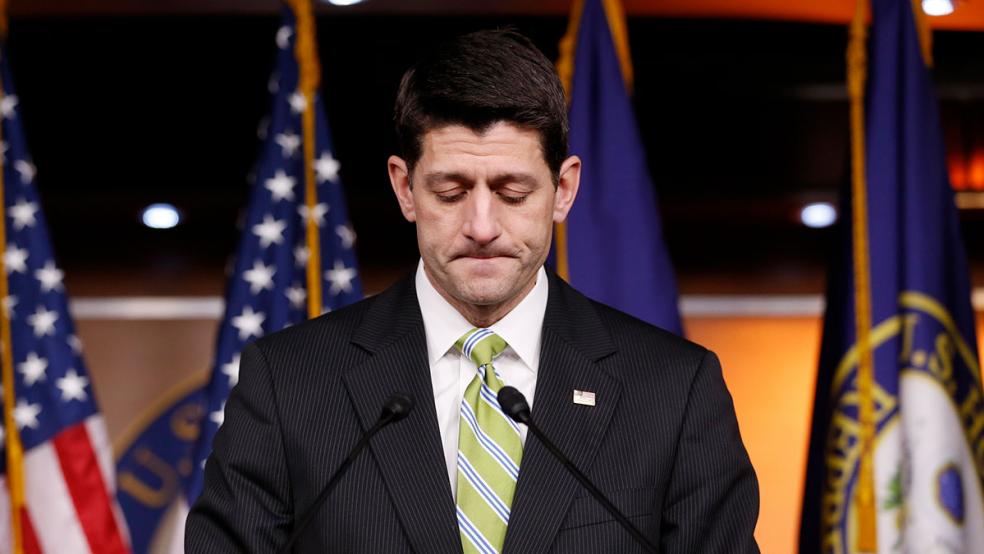If you think the fight over the Republican plan to replace Obamacare was ugly, here’s a small sign of the nastiness to come in the battle for tax reform. On Tuesday, the conservative Club for Growth announced a $500,000 ad campaign targeting four Republican representatives: House Budget Committee Chair Diane Black of Tennessee, Martha Roby of Alabama, Tom Rice of South Carolina and John Culberson of Texas. The campaign will encourage voters to push those representatives to oppose the border-adjustment tax (BAT), the plan floated by House Speaker Paul Ryan and discussed by President Trump (though he would rather it be called a “reciprocal” tax) under which U.S. companies would pay a flat 20 percent tax on supplies and products purchased overseas.
Morning Consult says the four are being singled out because they are in safe Republican districts but could be vulnerable to conservative challengers.
“All of the good progress Congress is poised to make on tax reform could be sunk if Republicans persist in creating a new trillion-dollar consumer tax. The BAT would drive up prices on everyday items for typical American families,” Club for Growth President David McIntosh said in a statement.
Related: Real Tax Reform Is Eluding Trump—Will He Go for the ‘Candy Option’?
"I am disappointed that the Club For Growth has taken to the airwaves, spending millions of dollars to attack the tax reform blueprint offered by House Republicans," Rice fired back. "Border adjustment is only one part of the tax reform plan that also slashes individual and corporate tax rates to make our country more competitive. I am for growth.... I'm not sure what the Club for Growth is trying to grow outside of their own checkbook."
As the Trump administration works to draft its tax reform proposal, conservatives’ knives have been out for the BAT, which would raise about $1.2 trillion in revenues over a decade. Treasury Secretary Steven Mnuchin acknowledged in an interview with the Financial Times published Monday that tax reform legislation likely wouldn’t reach President Trump’s desk by August, as he had previously indicated, because of the failure of the GOP’s health care reform. And while other senior administration officials told the FT that the BAT is not likely to be a part of the final tax reform proposal, Mnuchin said it remains on the table — but also that there may be other ways to raise $1 trillion over 10 years.
Even if the BAT dies, the ongoing fight over it is testament to just how difficult — or perhaps impossible — it will be to balance competing interests and devise a plan that cuts taxes and simplifies the system but doesn’t balloon the deficit. In the case of the BAT, while critics try to paint the proposal as a break for multinationals, it is really an issue that pits big businesses against each other, with retailers and automakers on one side and exporters on the other.
One aim of a border-adjustment tax is to give U.S. companies an incentive to manufacture at home — driving demand for American-made goods, creating more jobs and pushing up the value of the dollar.
The catch is that the dollar would have to go up 20 percent or more for Americans to have the buying power to offset the tax.
Related: Business Isn't Happy About Trump's 'Hire American' Executive Order
Critics contend that it would be a trillion-dollar tax on consumers over 10 years and say that yet another levy on Americans is not the answer to getting the country back on an even financial footing. And economists at the New York Fed have questioned whether the dollar would rise because of the tax plan alone and argued that “other countries could implement the same tax or retaliate against the United States in other ways on trade,” according to CNNMoney.
The Club for Growth trots out the same line as the National Retail Federation — that the average American family would pay an extra $1,700 a year because of the tax, which like European value-added taxes, is consumption-based.
The NRF is one of more than 450 companies, retail associations and trade groups that have formed a coalition, Americans for Affordable Products, and hired Washington public affairs firm DDC to forge a strategic campaign against the proposed tax.
Related: Was NAFTA Really So Bad for the Economy?
Joshua Baca, a senior vice-president at DDC and a spokesman for Americans for Affordable Products, on Tuesday declined to disclose how much the group is spending to fight the BAT or identify “funders,” but he did cite the NRF as an anchor member.
A spokesman for the NRF, David French, has said: “American consumers are being asked to foot the bill for a new $1 trillion tax giveaway for multinational companies.”
But according to the website of Americans for Affordable Products, among the members of the anti-BAT coalition are big businesses such as Walmart and Target (both multinationals), plus Walgreens, Best Buy, BJ’s, Costco, JCPenney, Levi’s and Macy’s.
They are lined up against a group of about 25 multinationals, the American Made Coalition, which includes Boeing, Caterpillar, Dow, GE, Johnson & Johnson, Merck, Oracle, Raytheon and United Technologies.
Related: Why Ryan’s ‘Border Adjustment’ Import Tax Is So Controversial
Among the opponents of the BAT are the billionaire conservative activists Charles and David Koch. Americans for Prosperity, a political advocacy group backed by the Kochs, said last week that it is spending six figures on a commercial that will air nationwide, according to The Hill.
When asked if Americans for Affordable Products was backed by the Kochs, Baca, the AAP spokesman, said: “No, we are not.” But Americans for Prosperity is one of the groups listed on the AAP website as a member of the coalition.
This article was updated to include comment from Rep. Tom Rice.





